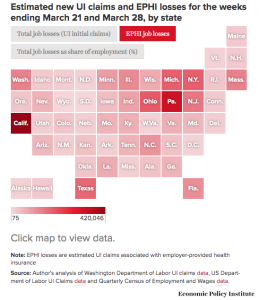Things that are keeping me awake at night (besides the normal problems associated with being a 61 year old guy)
The number of people without health insurance will increase – a lot, driven by:
- 10 million have lost their jobs – as of last week – and those lucky enough to have good health insurance will be hard-pressed to pay health insurance premiums much less deductibles and copays. This from the Economic Policy Institute, “EPHI” is Employer provided health insurance”; link to interactive site is here

- Many service workers don’t have employer-sponsored health insurance; some might qualify for Medicaid after a layoff unless they stay working part time or have other income. For those who live in the 17 states that haven’t expanded Medicaid, it’s even harder to qualify.
- The Trump Administration is refusing to open the Federal Insurance Exchange to allow people without health insurance to sign up – but pretty much every state-run exchange has already done this.
- The Trump Administration is still trying to overturn the ACA, which would kill Medicaid expansion, eliminate the requirement that insurers cover young adults (between 18 and 26) on their parents’ insurance plans, and allow insurers to discriminate and upcharge people with pre-existing medical conditions.
- more on this issue here.
Note – in yesterday’s press conference, President Trump did make some vague comments about possibly using Medicare and/or Medicaid to pay for COVID treatment. Here’s the quote:
“I’m not committing,” said Trump. “I have to get approval. I’ve got a thing called Congress. It’s something to look at and we have been looking. “
This would require a massive change to Medicare and/or Medicaid laws, followed by an equally massive change in lots of regulations, followed by…who knows what. Reality is, there are way better ways to address this.
Back to the growth in the uninsured and implications for COVID:
- some/many will not get tested for COVID as they can’t afford treatment and are terrified of debt. Some of these folks will continue to work because they have to, which increases the likelihood they’ll spread the disease.
- hospitals and other healthcare providers – which are already struggling financially because they aren’t doing profitable surgeries for privately insured patients – are going to be delivering a lot of care to people who can’t pay for it.
Net – fewer people with decent health insurance will mean more people will get infected, and the healthcare delivery system is going to have serious financial problems.
A modest proposal.
Here’s a fix. The federal government makes COVID testing and treatment a federal benefit for all residents (yes undocumented people too) and reimburses providers at Medicare rates.
This would:
a) alleviate the huge financial pressure on hospitals, EMS, and all healthcare providers;
b) increase the number of people tested; and
c) get us back on track sooner than if we do nothing.



I like your proposal for all the reasons you mentioned. Plus it’s the right/just/decent thing to do. Deficit hawks will argue we can’t afford it, but on the heels of a $2.2T stimulus package, I imagine your proposal wouldn’t even move the needle on the national debt.
Thanks Arnold – we’re on the same page. At this point we need to get rid of as much stress and friction as possible; this would alleviate a lot of the financial issues for all involved. thanks for the comment – Joe
My best to you Joe, stay safe and healthy!!!
Thanks Rebecca – all the best to you and your loved ones – and the rest of the fine folks at MTI
You’ve got my vote Joe! I agree with everything you said – and here is another kicker to consider. Private healthcare rates for those that do have it are going to increase – a lot – because of COVID-19. Your proposal could help that somewhat, but I still think this is going to get a lot worse before it gets better.
thanks much Paula – we agree, that things are going to deteriorate for some time undetermined. I’m hoping that several things come out of this:
a) voters value government programs and workers more;
b) science gets its due;
c) we re-think the issues inherent in the role of for-profit organizations in healthcare.
I also hope the Easter Bunny brings me some peeps…